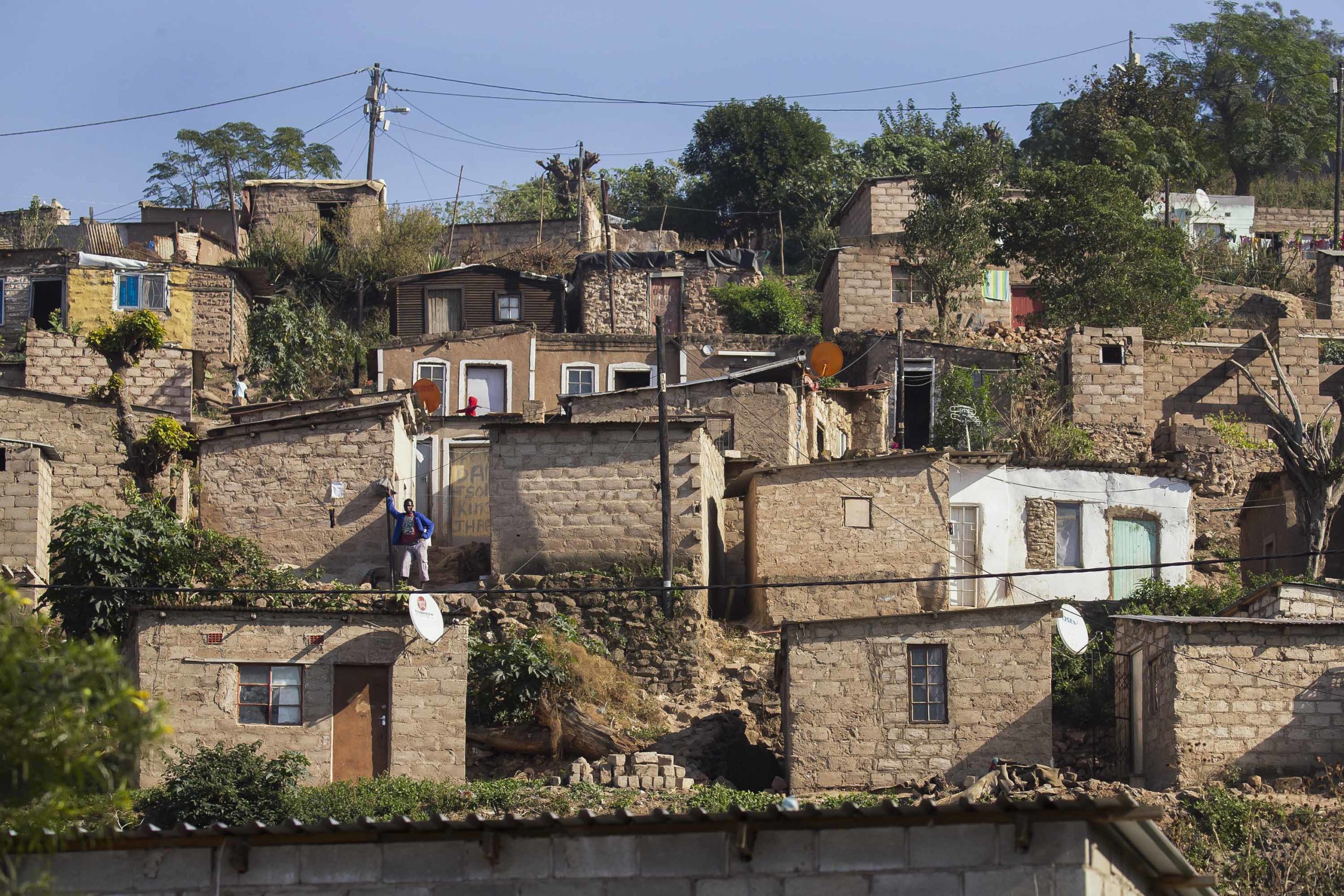The politics of a basic income
With a basic income grant well and truly on the cards, the kind of grant South Africa might get is as important as whether we get it at all.
Author:
30 July 2021

South Africa will not be the same after the campaign of sabotage allegedly organised by Jacob Zuma’s supporters in and around the ANC, and the massive riots that emerged in the disorder. As expected, the state’s initial response is taking the form of increased spending on both security and welfare. R950 million has been allocated to the police and the army, and R27.7 billion for the extension of the R350 social relief of distress grant until the end of the financial year in February 2022.
The termination of the grant on 30 April, in the context of endemic hunger, generated a sense of social abandonment and was one of the triggers for the massive food riots that engulfed cities and towns in KwaZulu-Natal. The staggering scale and intensity of these riots and the wider forms of simultaneous disorder – organised and spontaneous – far exceeds that of any previous riots in our history, as did the death toll, which now sits at 337.
Related article:
The frequently hysterical criminalisation of ordinary people who took the opportunity to appropriate food, often enabled by the inability of many to understand that the events that are coming to be called the July Riots had multiple causes and strands, is already resulting in the systematic abuse of impoverished people by the police and the army. But while these abuses are likely to continue, and the deployment of the army to the streets may be sustained beyond the immediate crisis, the state does not have the capacity to reduce the prospect of this kind of social upheaval continuing solely by escalating the already militarised forms of governing impoverished people.
Some sort of concession in the form of welfare was inevitable. The question was what form it would take. Earlier this week, when Minister of Finance Tito Mboweni outlined the government’s latest economic relief package, he strayed squarely into a vile, centuries-old bog where work is thought to be necessary to impose discipline on the unruly multitudes.
Echoing colonial justifications for a slew of racist legislation, the pass laws chief among them, Mboweni hailed the “discipline” of work. In a jobless economy – with 40% of working-age men and 51% of working-age women unemployed – people are more disciplined with their money, he said, when it is earned rather than given. This was an expression of the minister’s right-wing posture rather than a statement with any connection to empirical reality in a country in which most people spend most of their money on food.
Deserving and justified
The minister’s presentation of welfare as a gift instead of an allocation of a tiny part of a rightful share of the nation’s wealth is now well worn. But it is a lesson that the criticism regularly levelled by ordinary people – who claim their social grants not as grateful recipients but as entitled citizens – should have taught him by now.
It appears that Mboweni’s concern with imposing discipline on the oppressed, instead of assuring a decent material existence, was driven by the fact that South Africa now appears closer than ever to pursuing policies that approach a basic income grant, in practice if not yet in name. (It was a real possibility in the early 2000s, but was rejected in favour of the social grants that have acted as the country’s strongest bulwark against absolute poverty as well as a mealy-mouthed combination of training and work-guarantee programmes.)
Many orthodox economic commentators were quick to claim the reinstatement and extension of the social relief of distress grant as a victory for Mboweni in the now fully transparent ideological battle being waged between his National Treasury and the Presidency. But there was a quiet confidence in the more heterodox hemisphere. Having been won through both the efforts of various progressive research and lobbying formations and the recent and desperate efforts of thousands to get their hands on the most basic provisions in KwaZulu-Natal and Gauteng, it is now hoped that the grant might be entrenched as a permanent form of basic income.
Related article:
A basic income at the food poverty line for the unemployed would cost the government close to R70 billion every year. There are a number of ways to finance that sort of spending, and with advanced and emerging economies around the world having implemented extraordinary policies to offset the pandemic, they are unlikely to unnerve financial markets.
Our concerns, then, should not be technical. They should be political. Ultimately, the basic income grant we get will reflect the social and political forces and not the fiscal constraints that shape it.
The grant’s intricate balancing act
Many progressive voices – here and elsewhere, now and then – have called for universal basic income. Martin Luther King Jr did. So did the Movement for Black Lives. South Africa’s labour movement – in a further sign that unions around the world may be softening to the proposal – now largely agrees on its necessity.
But it is no less favoured by conservatives and even by some of the most notorious racists. Charles Murray, famous for drawing a racial distinction in intelligence according to genetics, was a proponent. So was the doyen of neoclassical economics, Milton Friedman. For some of these people, basic income, just enough to sustain bare life, is a contemporary form of what was called “pacification” in colonial times.
In the most recent Democratic primary race in the United States, universal basic income was at the heart of the libertarian wing of the party, not the social democratic one. Andrew Yang echoed other techno-capitalists’ enthusiasm for the policy, while Bernie Sanders chose instead to focus on a minimum wage and standards of healthcare, education and housing.
This political ambivalence about universal basic income indicates that careful thought is required.
Related article:
A basic income grant, for instance, might deal a blow to bosses’ ability to fire their workers by effectively acting as a permanent strike fund. It might also allow workers to say no to the kinds of slave-like work that characterise the lowest rungs of the country’s severely unequal income distribution. It might put a great deal more agency into the hands of women, who are mostly trapped in the current system of conditional grants, and in turn start to chip away at the feminisation of poverty.
Other forms of social support – relief after shack fires, housing, access to work programmes and so on – are typically mediated through local party structures that relentlessly exploit this control to accumulate personal wealth, reward loyalty and punish dissent. Cash transfers are able to avoid this because they are not mediated by local elites.
But for every possible gain, there is a regressive threat.
In increasing workers’ individual power, the grant may undermine the bargaining power of unions. It might be used as a guise to weaken existing welfare programmes, for which the current treasury has already shown a voracious appetite when it slashed social spending in February. If overseen by either an incapable or kleptocratic state – both fair characterisations of South Africa’s administration over the past decade – the grant could easily become a distraction that would allow the government and business to avoid necessary structural transformations of the economy.
No grant without politics
Make no mistake, if driven by a strong grassroots movement fighting for a decent standard of living, a basic income grant would herald unprecedented gains for South Africa’s impoverished masses.
Basic income, while only a reform of the current economic system that would leave its foundations largely intact, would likely make dramatic inroads into South Africa’s endemic poverty. More than this, it would empower workers, especially women, to say no to bad jobs, abusive working conditions and other indignities forced on them under current economic conditions. This ability to better secure currently vulnerable social lives makes it a policy that should be defended and fought for.
Related article:
We should be concerned, however, that this is not currently the way South Africa’s economic policies are made. And, on the one end of the elite joust that is shaping those policies is a treasury that has given no cause for confidence that a basic income grant would not come at the expense of other public goods, or be used to buy people out of the labour market.
We should not be fooled into thinking any technical arguments will change this. A basic income grant is a double-edged sword. Landing on the right side of it depends in no small part on maintaining and bolstering the current social security system and structurally transforming the economy.
But the riddle is not the grant itself. It is the social and political forces that will act as its midwives. The only thing capable of holding Mboweni and his treasury accountable to a progressive basic income grant is an appropriate popular politics organised at sufficient scale, intensity and duration. The research and lobbying non-governmental organisations that have worked steadfastly to realise progress on this front have done impressive and important work. It is imperative that this accumulation of long years of policy and lobbying work is brought into sustained conversation with the progressive organisations of the working class and impoverished people, and that the reach and power of those organisations is extended.




